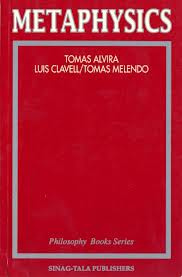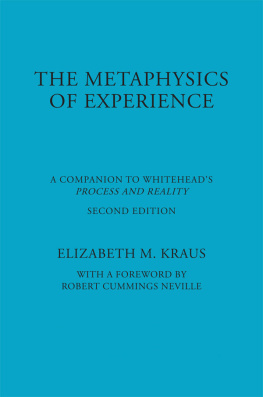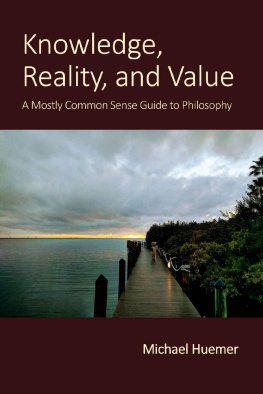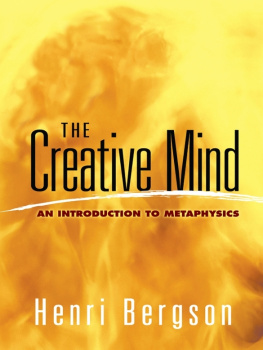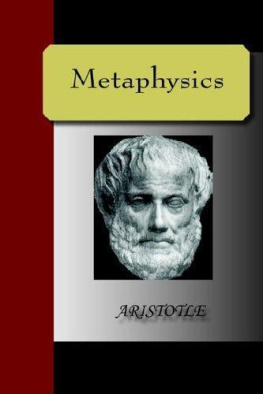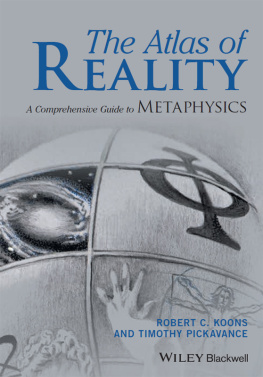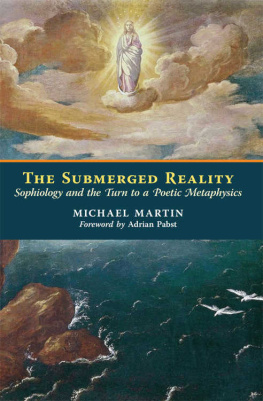Tomás Alvira - Metaphysics: The philosophy of reality (translated)
Here you can read online Tomás Alvira - Metaphysics: The philosophy of reality (translated) full text of the book (entire story) in english for free. Download pdf and epub, get meaning, cover and reviews about this ebook. year: 0, genre: Science. Description of the work, (preface) as well as reviews are available. Best literature library LitArk.com created for fans of good reading and offers a wide selection of genres:
Romance novel
Science fiction
Adventure
Detective
Science
History
Home and family
Prose
Art
Politics
Computer
Non-fiction
Religion
Business
Children
Humor
Choose a favorite category and find really read worthwhile books. Enjoy immersion in the world of imagination, feel the emotions of the characters or learn something new for yourself, make an fascinating discovery.
- Book:Metaphysics: The philosophy of reality (translated)
- Author:
- Genre:
- Year:0
- Rating:5 / 5
- Favourites:Add to favourites
- Your mark:
- 100
- 1
- 2
- 3
- 4
- 5
Metaphysics: The philosophy of reality (translated): summary, description and annotation
We offer to read an annotation, description, summary or preface (depends on what the author of the book "Metaphysics: The philosophy of reality (translated)" wrote himself). If you haven't found the necessary information about the book — write in the comments, we will try to find it.
Metaphysics: The philosophy of reality (translated) — read online for free the complete book (whole text) full work
Below is the text of the book, divided by pages. System saving the place of the last page read, allows you to conveniently read the book "Metaphysics: The philosophy of reality (translated)" online for free, without having to search again every time where you left off. Put a bookmark, and you can go to the page where you finished reading at any time.
Font size:
Interval:
Bookmark:
METAPHYSICS
Copyright 1982. Tomas Alvira, Luis Clavell, Tomas Melendo. EdicionesUniversidad de Navarra, S.A. (EUNSA) Plaza de los Sauces, 1 y 2. Baraain -Pamplona (Espaa)
1991 English translation Sinag-tala Publishers, Inc.
Translatedby Fr. Luis Supan
Translationedited by Fr. M. Guzman
ISBN971 117 197 X
SINAG-TALAPUBLISHERS, INC.
P.O.Box 536, Greenhills Post Office Metro Manila 1502, Philippines
During the last two decades, a great part of theabundant philosophical works published consisted of monographs and essays thatcould best be described as historiographic and taxonomic. This phenomenon wasaccompanied by an over-all decline in the publication and use of philosophicalworks that are more general in scope, such as manuals. This may have been dueto changes in contemporary readers' tastesthey now seem to be turned off bythe excessively systematic approach and the high-flown erudition of manyphilosophy manuals.
On the other hand, the growing penchant forspecialization and for the acquisition of a deeply historical as well asspeculative understanding of philosophical questions has diverted our attentionfrom one indispensable task, that is, that of providing those who would like togo into the field of philosophy with basic knowledge that can serve as thefoundation for a fruitful assimilation of the wide repertoire of specializedstudies.
This book is meant to be a manual on basicphilosophy, that is, metaphysicsthe science of being, as it has always been understood from the time ofParmenides, Plato, Aristotle, and St. Thomas Aquinas up to the present.Metaphysics is especially relevant in our time as philosophy begins opening upagain to the transcendence of being after centuries of subjectivist confinement. Contemporary studies onphenomenology, existentialism, and analytic philosophy are once again startingto raise questions regarding being.
Ouraim is to present metaphysical principles in a clear and orderly way for thereader. Thus, he will be capable of tackling the various pressing philosophicalquestions faced by men of our time.
T. Alvira
L. Clavell
T. Melendo
The universe has always spurred men to wonderabout its origin. Men havelabored continuously, seeking an explanation for the universean explanationthat can be considered ultimate and universal or all-encompassing. In this effort, various schools of thought arose throughout the course ofhistory, each one offering its own explanation. Some identified the mostradical basis of reality with one particular element intrinsic to it, such asmatter, the spirit, thought or motion; this would imply that everything in theuniverse is just an offshoot or derivative of that element. On the other hand,some maintained the existence of a transcendent Principle which made theuniverse without forming part of it. Some thinkers proposed the existence ofonly one origin of the universe, while others held that the universe came to befrom two or more sources.
These questions are notpurely speculative; on the contrary, they exert a deep influence on humanexistence. It does make a difference for a man to believe that everythingincludinghimselforiginated from inert matter and will go back to it, or to believe thathe was created by God, who brought him into being from nothing. To regard menas beings subject to the whims of blind destiny, or as absolute masters oftheir own existence, or as creatures capable of freely knowing and loving a personalGodall these are doctrinal options that mark out completely divergent pathsfor man's life.
Initially,the study of these questions formed only one undifferentiated body of knowledgecalled philosophy, wisdom, or science. Soonafter, however, studies on different aspects of reality (e.g., mathematics,medicine, grammar) gave rise to special or particular sciences, which becamedistinct from philosophy proper which dealt with the more fundamental questionsabout reality. In turn, as the body of philosophical knowledge grew, thereappeared branches of philosophy dealing with specific objects of study, such asnature, man, and morals. One discovers among these branches, a core ofphilosophical knowledge that influences all the other branches, for it seeksthe ultimate structure of the universe, which necessarily leads to the study ofits first and radical cause. This science is called metaphysics.
1. The Notionof Metaphysics
At this point, metaphysics may be defined as the study of the ultimate cause and of thefirst and most universal principles of reality. Let us nowdiscuss in detail the parts of this preliminary definition.
a) Ultimatecauses are differentiated from proximate causes which produce in an immediate mannersome specific effects. For instance, a rise in atmospheric pressure is thecause of fine weather; the heart is the organ that causes blood circulation.The study of these causes pertains to the field of particular sciences.Ultimate causes (also known as supreme causes), in contrast, extend theirinfluence to all the effects within a given sphere, as a political leader doeswith respect to his country, or a person's desire for happiness in relation tohis entire human activity. Metaphysics considers the absolutely ultimate causeof the universe. It strives to identify that cause, and know more about itsnature and its activity. Since God is the ultimate cause of all things, he isevidently a principal subject matter of metaphysics.
b) Metaphysicsalso studies the first and most universal principles of reality. Aside from causes thatexert their influence on their effects from the outside, there exist internalelements in the effects themselves that constitute them and affect their mannerof being and acting. These are usually called principles; thus, atoms arecertain principles of molecules which determine the nature and properties ofthe latter; in living beings, cells act like the principles of the organism.But metaphysics seeks the first and most universal principles, that is, thoseprinciples Which radically constitute all things. Thus, philosophers tend toconsider some particular aspect of reality as the most basic, and as such, theorigin of everything else (for example, change or becoming, quantity, theessence, or chance). Whenever someone considers something as the firstintrinsic principle of everything, he is already talking at the metaphysicallevel. At this level, metaphysics includes everything real within its field of study because it seeks theultimate cause and fundamental principles of reality; in contrast, particularsciences study only a limited aspect of the world.
Examplesof scientific studies are: the atomic structure, the digestive system ofanimals, plant diseases. These sciences advance in their own field thanks to abody of permanent knowledge which serves as their basis, and which is alwaysassumed or taken for granted in every scientific research. For example, thenotions of plant life, of life in general, the material body, quantity, and thelike. Scientists ordinarily do not conduct further studies regarding these, butif they ask, "What is life?", "What is quantity?","What is to know, to see, and to feel?", then they are already posing philosophical questions. There are actually questionsmore radical than the previously-mentioned ones, and which are in turnpresupposed by them: "What does it mean to be ?", "What is causality?","What is the meaning of the universe?", "What is truth?","What is good?"all these questions pertain strictly to the field of metaphysics.
2. Metaphysics as the Science of Being as Being
Every science has its own object of study whichis an aspect of reality that it deals with." For instance, biologyconsiders the world of living beings, mathematics studies the quantitativeaspects of things, and physical geography deals with the earth's surface. Theobject of study of a specific science characterizes or defines that science,gives internal coherence to its content, and differentiates it from othersciences.
Next pageFont size:
Interval:
Bookmark:
Similar books «Metaphysics: The philosophy of reality (translated)»
Look at similar books to Metaphysics: The philosophy of reality (translated). We have selected literature similar in name and meaning in the hope of providing readers with more options to find new, interesting, not yet read works.
Discussion, reviews of the book Metaphysics: The philosophy of reality (translated) and just readers' own opinions. Leave your comments, write what you think about the work, its meaning or the main characters. Specify what exactly you liked and what you didn't like, and why you think so.

